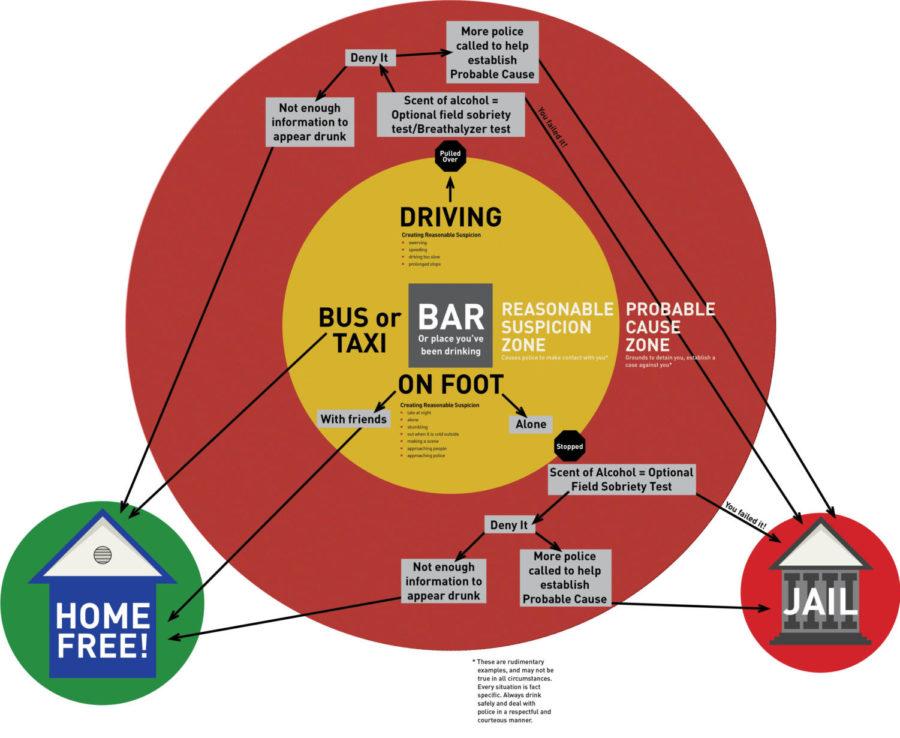A rough guide to a smooth night on the town
A rough guide to a smooth night on the town
April 28, 2011
Regardless of your political beliefs, we’ve evolved beyond the early days of arbitrary arrests, thanks to the First and 14th Amendments. However, these constitutional freedoms are not always respected, leaving it in the hands of citizens to know their rights.
Students seem to have a misconception about the law, and there are many myths about how to avoid how to go to jail. Fortunately, we’ve done some homework to help keep students out.
First of all, the police know the law and it is their duty as agents of the state to uphold it. So chances are, they probably know your rights better than you do.
“Most people don’t realize how much we have to know about the law,” said Patrick O’Bryan, Ames police officer. “We’re more of an expert with the Fourth Amendment then a lot of attorneys are. Because that’s our job: search and seizure. When we arrest somebody, we arrest their freedoms, so we have to have a good reason to do it.”
Alcohol-related incidents are the most common crimes on the ISU campus, aside from parking tickets. As a matter of fact, there were 409 liquor law-related arrests in 2009 alone, according to the ISU Annual Security and Fire Safety released in 2010.
However, this shouldn’t deter students from going out on the weekend and knocking a couple back with their friends, but there are several ways you can stay safe and avoid unwanted encounters with police.
Enjoy house parties and keggers? Not a good idea, according to Ames Code, which has a whole section dealing with those. Section 17.18.1(2) states that it is illegal, “To sell, offer to sell, dispense or serve, for a single payment, fixed in advance, an unlimited or indefinite number of servings of alcoholic beverage or an unlimited or indefinite amount of alcoholic beverage.”
In other words, buying a refillable $5 dollar cup at a kegger or jungle juice party could earn your gracious host a fine or simple misdemeanor charge. Also, if you’re younger than 21, your party hosts will have to kick you out and disperse the party, unless you want to earn them another misdemeanor.
Once you’ve been removed from the party or bar, you’ve got to be on your guard. Drinking in public is illegal and will warrant a fine or misdemeanor charge and could earn you a night in jail. Also, if you’re younger than 21 and you’ve got booze, you can also earn yourself a fine or simple misdemeanor.
However, the law is always open to interpretation and an arrest depends on several factors. Every situation is fact specific.
Police base arrests on a concept called “probable cause” that stems from “reasonable suspicion,” and Stephen Holmes, Story County Attorney, knows this stuff.
“Reasonable suspicion gives the officer the right to make contact with you and try and figure out what’s going on,” Holmes said. “If they are given more facts that some criminality is afoot, something criminal is going on, then they now have the ability to continue that contact with you and develop probable cause to arrest you.”
Essentially, reasonable suspicion is based on observations police make that will compel them to approach you.
As soon as a police officer makes contact with you, he or she will begin looking for clues in order to build a case or establish or dismiss a “probable cause,” to arrest you for a crime.
“When you really stop and think about it, it’s simply a matter of common sense,” Holmes said. “Everything that we deal with here is common sense. There’s nothing particularly tricky about it at all.”
For the most part, if you want to stay out of trouble, just don’t make a spectacle of yourself.
“What you have to consider is how many drunk people are on Welch [Avenue] on a typical Friday night,” said officer Nate Rivera of the Ames Police Department. “There are a lot of drunk people. Imagine what you have to do to stand out in a crowd of 1,500 to 1,000 people at bar close.”
Accordingly, the police aren’t out to just bust people, and are only trying to ensure public safety.
“A vast majority of the time, public intox arrests are safety-oriented because that person has become intoxicated to the point where they are a danger to themselves,” Rivera said. “That is one of the biggest things people overlook.”
“People think we’re picking on these college kids, but we’re not. We’re just trying to make sure that they get home safe and we don’t have to send a cop to tell the parents that their kid is dead.”
Avoiding tickets and staying out of jail is easy. No guarantees, but follow this fun and educational guide and you’ll be well on your way to a safe evening and your own bed.







